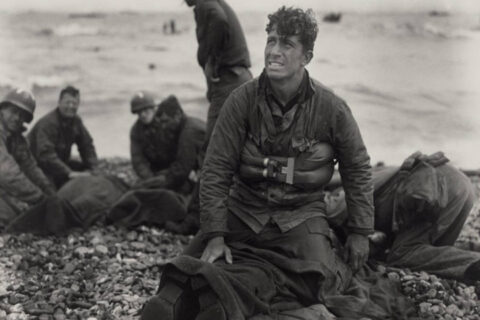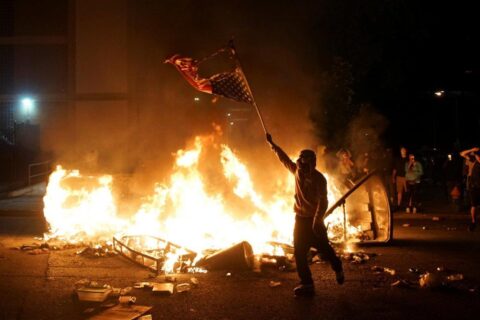Part I: The Menace of the Alien and the Culture of Collapse
There was an article here not long ago talking about the Civil Rights Movement as a war – a war which, the author correctly concluded, we Southerners lost, and lost largely because we did not bring to bear force sufficient to meet that of our enemy. There was much, however, that was left unsaid in that article. The focus was on the Civil Rights Acts of 1964 and the Fair Housing Act of 1968; but there is a much longer history of leftist, and particularly black, political violence outside of the 1963-1973 window. There is a reason for this: because in the Western world, non-white political violence tends to work. To understand why, we have to consider the macrohistorical and the microhistorical context in which this violence is taking shape, and we also have to understand that whatever their faults or virtues, nations with Anglo-Saxon roots tend to be profoundly reasonable when dealing with threats.
as a war – a war which, the author correctly concluded, we Southerners lost, and lost largely because we did not bring to bear force sufficient to meet that of our enemy. There was much, however, that was left unsaid in that article. The focus was on the Civil Rights Acts of 1964 and the Fair Housing Act of 1968; but there is a much longer history of leftist, and particularly black, political violence outside of the 1963-1973 window. There is a reason for this: because in the Western world, non-white political violence tends to work. To understand why, we have to consider the macrohistorical and the microhistorical context in which this violence is taking shape, and we also have to understand that whatever their faults or virtues, nations with Anglo-Saxon roots tend to be profoundly reasonable when dealing with threats.
The Classics
Among the great Classical ethnicities, the Lacedaemonians stand apart for their cold logic and pragmatism. Greeks were never squeamish about murdering infants, for example, if they happened to be the wrong sex or merely unwanted, but the Spartans turned the practice into a science, using it to mold the most effective and well-functioning city-state in the history of the Indo-European civilizations, perhaps of all civilization. It should come as no surprise, then, that it took the Spartans very little time to figure out how to deal with the class of captive slaves they accumulated as they formed their culture from the crumbling ruins of Mycenaean culture in the Peloponnese. The origin of the helots is much debated, but their place in Spartan society is not: they were more than just slaves (δοῦλοι), but rather, like the Thessalonian Πενέσται, they were a race of bondsmen owned directly by the Spartan state. Thucydides tells us as he is discussing the Helot Ceremony that all Spartan policy governing the Helots was aimed at security and Plutarch speaks in his Life of Lycurgus of the annual practice of the ephors declaring war on the Helots so that a Spartiate could kill them with impunity (normally this incurred ritual uncleanness). The Spartans were ever-ready for a revolt of the Helots and Messenians they had subjugated, and kept these subjugated people firm in their minds at all times.
Consider in contrast that Spartacus’ rebellion took Roman elites of the late Republic completely by surprise. Appian informs us that when Spartacus was on the slopes of Vesuvius, Praetorians Glaber and Valerius were dispatched, “not with regular armies, but with forces picked up in haste and at random, for the Romans did not consider this a war yet, but a raid, something like an attack of robbery,” and that even after Spartacus had crushed both armies, and sacrificed 300 Roman citizens to his gods, the war was still “ridiculed and despised… as being merely the work of gladiators” and that no man could be found to lead the next expedition. This was after the two previous Servile Wars had also taken Roman elites by surprise—demonstrating a tremendous divorce from the reality they faced with such a large slave population, especially gladiators, whom they trained explicitly to fight. These wars plagued the late Republic – the first occurred shortly before the spectacular rise and bloody fall of the Gracchi’s populist movement, the third less than a decade after the death of Sulla.

The Spartans and the Romans would meet one another in battle, but it was when the Romans were a much greater people and the Spartans much lessened by time. Spengler places the great turning point for Classical Civilization at the Battle of Zama, the last time Rome faced an equal in battle; Sparta was crushed by Rome only seven years after Zama. The difference in their handling of subjugated and lesser peoples, however, illustrates a stark contrast in internal awareness throughout their social hierarchies. Even as Rome reached its glorious worldly height as a world Empire, it was so exhausted culturally and racially that disorganized barbarian raids could cause it to crumble, much as the Mycenaeans had at the hands of the Dorians some thirteen centuries before. In addition, rather than resist the alien, the comfortable Romans sought to appease and cajole with cessions of “rental” land and military service. Whatever Rome’s accomplishments, Burckhardt was right to comment that none of its achievements matched those of a single one of the Greek small states.
The West
The comparison of the United States to the Roman Republic is old and worn out, but the broader scope taking Western Civilization into consideration alongside the development and collapse of the Graeco-Romans does present some macrohistorical context for non-white violence. A brief excerpt from Atkinson’s translation of Spengler’s Jahre der Entscheidung offers perspective:
That Germans abroad should be ill-treated by colored people at the orders of English and French was not a surprisingly novel procedure. This method began in the Liberal Revolution of the eighteenth century: in 1775 the English enrolled men of Indian race to attack, burn, and scalp the American republicans, and it should not be forgotten how the Jacobins mobilized the Negroes of Haiti for the “Rights of Man.” But that colored men from all over the world should be massed on European soil to fight for whites against whites, that they came to know the secrets of the most modern war-methods and the limits of their efficacy, and were sent home with the conviction of having beaten white powers, all this fundamentally altered their view of the world’s power-distribution. They came to feel their own common strength and the weakness of the others; they began to despise the whites as erstwhile Jugurtha despised mighty Rome. It was not Germany that lost the World War; the West lost it when it lost the respect of the colored races.
Like the Romans, the late West has conquered, and then subsequently armed and educated (at least half-ways) a great mass of aliens who sat bitterly at our borders for two centuries before those border walls began to break down. From Toussaint L’Ouverture to Bill Ayers, black radicals have been raised up by the paternalistic hand of Western nations, which have then through (((certain influences))) turn against themselves, and directed the rebellion of their own helots against their own cities. In Brian Burroughs’ Days of Rage, he quotes a Weatherman activist, “we believed 3rd World countries would rise up and cause crises that would bring down the industrialized West, and we believed it was going to happen tomorrow, or maybe the day after tomorrow.” Weatherman, and later Weather Underground, believed precisely what Spengler predicted they would believe: that direct, violent action could be successful because the whites were so willing to tear themselves apart.

Spengler, however, also misses a stark contrast in White dealings with the Colored world. It is true that in 1775 the English enrolled Iroquois against Yankee rebels in New York and Pennsylvania, and it is likewise true that the Jacobin petit blancs used the Negro in Haiti to topple the grand blancs, but it is not true that these represent the same thing. The English enrollment of barbarian allies against their own rebels and the French rebels’ enticement of slave rebellion against their erstwhile social betters are of two different motives: on the one hand, pragmatic desperation, and, on the other, myopic idealism. The difference in Anglophone and Francophone dealings with colored peoples and natives would continue until the two became allies in the 20th century, when Britain’s liberalization was completed. Prior to this, the Anglo-Celtic cultural island in Western Civilization maintained its independence from both the burgeoning American and the myopic Gallic tendencies.
The South
The South is now perhaps the last bastion of a once great global culture that rotted from the Metropole outward starting at about the time of the American Revolution, when it became a tolerable phenomenon for a foreigner in Parliament to betray and sabotage the interests of Great Britain for continental idealisms and racial vendetta, and thereafter receive royal appointment to military office. (In one view, Sadiq Khan is merely the result of not charging Edmund Burke with treason and sending his head back to Dublin.) Rhodesia and South Africa fell before us, largely to betrayal by the metropole, but all share a common nature: existence in the midst of the colored world, and intensely aware of what White minority status looks and feels like.
The origins of the Second Amendment to the US Constitution is usually said to be found in the English Bill of Rights following the Glorious Revolution. Indeed, there is basis in this—and the Commonwealth of Pennsylvania included similar rights in its own Constitution. However, Pennsylvania at the time shared something in common with many Southern states in that it, unlike the Northeastern states, felt the menace of the non-White world at its doorstep. In 1776, the Delaware River had only recently been mastered; beyond the sparsely settled Wyoming Valley, the swamps and woods of the Pocono Mountains were savage territory, and (as the war-band leader Joseph Brandt would demonstrate) these were not a nation of people waiting blithely to be victimized by the one-sided White aggression found American history textbooks.
When James Madison—a Southerner and descendant of a member of the Knights of the Golden Horseshoe, great trailblazers and explorers who expanded Virginia colony into Shenandoah—wrote the Second Amendment, he had more on his mind than just defense against the tyranny of a surfeit of government. He also had defense against the tyranny of raw numbers: the minority status of White, Anglo-Saxon Protestants on the North American continent, with the French still in Louisiana, the Spanish in Florida and Mexico, and nameless millions of native savages in the gaps in between, to say nothing of the hundreds of thousands of Negro slaves who had already demonstrated their willingness to rebel if a suitable leader presented himself (as in the case of Jemmy Cato in 1739 and the New York rebellion, led by free blacks, in 1741). The Spartiate was required by Spartan law never to ground his spear, or unstrap his shield, outside his home. Madison knew better than to allow for the possibility that they might be stripped of the ability to defend themselves against domestic foes and hostile aliens in a time of crisis.
In the South, as in England for thousands of years, masculine expressions of violence maintained the social order. Dueling, often merely performed as rituals in which both participants shot over the other’s head, preserved honor and dignity, and upstarts who didn’t know their place were punished like feral hounds. Slaves, white and black, felt the lash in response to disobedience or flight, and were reminded of their dependence on their masters’ charitable tolerance of their shortcomings. Hierarchy was strict, and social interaction lubricated copiously with social honorifics and customary ritual action. This was a society which knew where it stood in relation to the world, and understood the fragility of their place in it.

In such a world, political violence is never effective, because protections against it are too widespread; society is too vibrant, leadership too virile and vigilant. The rise of political violence as an effective means of accomplishing the goals of the colored world is precisely the result of the destruction of this world, of the death of those last vestiges of Western vitality and of the self-awareness of Western elites.
Black Faces, Black Flags
It took less that 50 years after the fall of the South and the failure of the First Reconstruction for Western elites to finally give into exhaustion. The decay of blood ties, the fall of a cultural Spartiate and rise of a moneyed elite (just as wealthy plebes wielded greater power than impoverished patricians in the Late Republic) meant a shift in priorities away from the preservation of civilization towards the preservation of material well-being. Thus over the course of the 20th century, the growing comfort of the Consumer Class in the Western world accompanied a growing terror that all they had could vanish in a moment if they didn’t appease unpredictable non-Western populations. Each time a new revolt happened, the reaction was predictable surprise that previous measures had failed to appease and a scramble to correct the errors. While in Rome, a civilization defined by restoring balance, the elite responded with military measures to remove the threat, the introspective West searched the inmost parts of their cultural soul to find where they had erred, and with (((some outside help))) found that atonement for sins was necessary.
By the time South Africa finally fell in the 1990s, it was the last corner of the Western world that had failed to put on sackcloth and ashes. When Black Lives Matter began their new wave of terrorism, the hand-wringing began anew; when a nail-bomb detonated in Manchester, the predictable reaction has been that Whites have failed to do enough to appease the barbarians, and suffer now as a result of their sins. Thus the final remnants of Lacedaemonian resistance to the alien have vanished into Roman confusion and cognitive dissonance.
To be continued in Part 2…





Thanks for the well written didactic. The historical elements and idioms were apt. I will add: Blue Collar White (Christian) Males/BCWMs bear the brunt of incessant insults – numerous unconstitutional edicts specifically created to disenfranchise them politically, professionally, & academically – Affirmative Action, et al. These affronts have endured longer than the ostensible causality; Plessy v Ferguson. Segregation was cited, ad nauseum, to infer a fictional “debt” to justify implementation of the policies of “restitution”. These men and their families were shuttled to the back of the bus once LBJ articulated the path and Nixon’s executive order enabled the theft. BCWMs are a frustrated and despondent, untapped, resource that represents 20-30 million citizens who do not vote. They own guns, work with their hands, and are physically fit. Many are former military. The greatest obstacle – No politician will dare represent them or consider returning their God given Rights. That starts with ending Affirmative Action and ancillary edicts. Historically, the nexus of this cultural betrayal was Darwin’s Theory – which strategically produced an environment ripe to Murder God. The Theory invited and codified Nietzsche and Marx’s emotional blither. Dickens perversion of Christian ethos completed the treacherous trifecta. The mocking of morality and slander of divine reverence sanctioned the murder. After all the monarchies of Europe fell, the deaths of men who knew the real world price of freedom and cultural cohesion completed the first part of a God-less society. Recall the US was not yet a world power. The white world at last lost their intellectual icons in WWI – British aristocrats, who died, well knew the means and methods required to preserve a lasting civil society – intimidate or eliminate ne’er-do-wells and those who exploit their emotional insolvency. It’s not enough to defeat an enemy if lasting peace is the objective. The enemy must have its support community eradicated or set in disarray – with prejudice. That type of, and commitment to, absolute discretion is what’s required. We can argue the validity of methodologies and means, but Stalin, Mao, and Pol Pot did what was needed to remove the risks of an enemy within. The Jewish Bolsheviks that financed and promulgated Communism literally took no prisoners to preserve their preferred political agenda and campaign of indoctrination. Communist policy objectives now direct the operational ambitions of International conglomerates, as they act to implement fascist control over the industrialized world. The EU is the paradigm. The USA is the remaining prize. Formalized threats (PC mandates/Hate crimes) are placed throughout society to indoctrinate, intimidate, defame, and destroy the American Way of Life and its purveyors – Straight, race conscious, two-parent, traditional families, BCWMs. Defeating this threat requires: defining righteous behavior, identification of the threat and means utilized, confronting and commuting concerns about equality/fairness, and commanding a unified confederation of culture. Traditional Americans are the sworn enemy of the State/Democrat Party. They are owed no quarter.